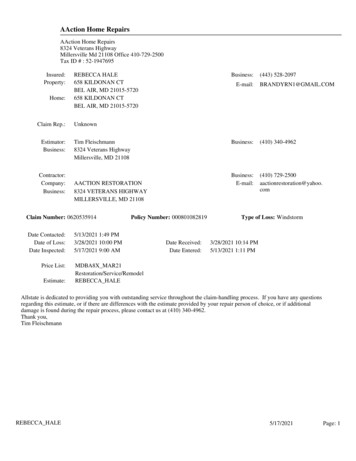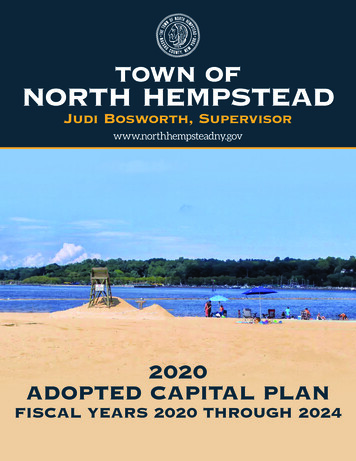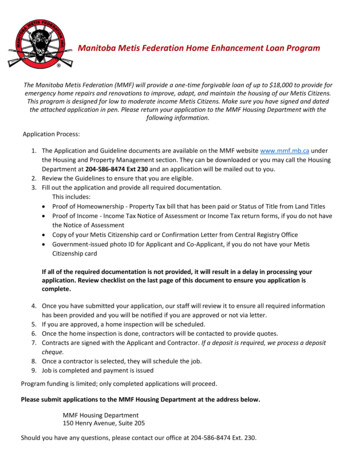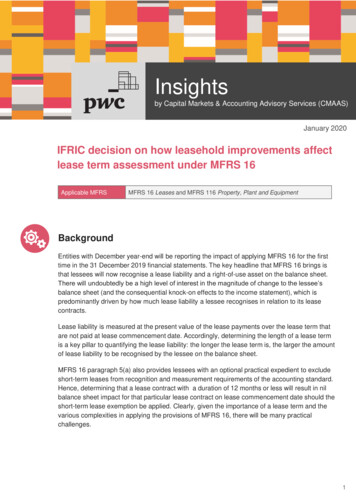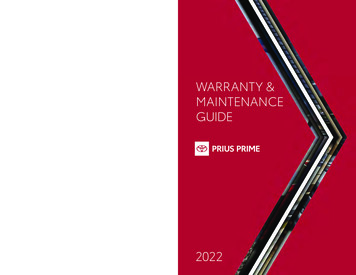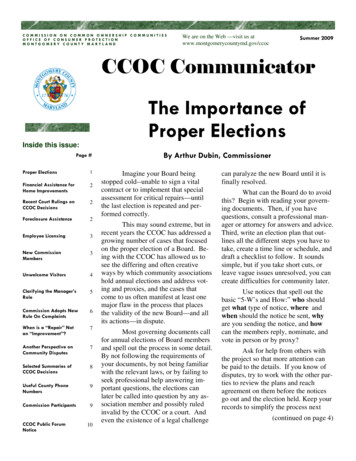
Transcription
Factsheet 67Home improvements and repairsMarch 2022About this factsheetThis factsheet provides information about the help you can get if yourhome is in a poor condition or unsuitable for your needs.It includes information on the financial assistance and practical supportavailable to help you make improvements, as well as rights to repairs inrented housing.The following factsheets may also be of use to you: FS63 Finding private rented accommodation FS8 Council and housing association housing FS64 Specialist housing for older peopleThe information in this factsheet is applicable in England and Wales. Ifyou are in Scotland or Northern Ireland, please contact Age Scotland orAge NI for information. Contact details can be found at the back of thefactsheet.Contact details for any organisation mentioned in this factsheet can befound in the Useful organisations section.Please note, the government issued guidance on landlord repairsand working safely during the Covid-19 pandemic.This is not covered as it can vary by area and in line with nationalrules. Seek advice for an up-to-date position.Page 1 of 28
Contents1 Local authority help41.1 Grants and loans41.1.1 Disabled Facilities Grant (DFG)41.1.2 Housing Renewal Assistance61.2 Help from social services71.3 Help from Environmental Health82 Home Improvement Agencies (HIAs)93 Heating and insulation improvements103.1 Boiler and other heating emergencies114 Gas and electrical safety125 Tenants’ rights125.1 All tenancies125.1.1 Repairs135.1.2 Fitness for human habitation135.1.3 Gas safety145.1.4 Electrical safety155.1.5 Smoke and carbon monoxide alarms165.1.6 Furniture165.2 Social tenancies175.3 Private tenancies – energy efficiency175.4 Houses in multiple occupation185.5 Getting works done195.5.1 Reporting disrepair or unfitness195.5.2 Making a complaint195.5.3 Taking further action205.5.4 Security of tenure and disrepair215.5.5 How the local authority can help225.5.6 Doing repairs yourself22Age UK factsheet 67Home improvements and repairsMarch 2022Page 2 of 28
6 Charities237 The Social Fund238 Help with interest payments on loans239 Homeowners - using your home as capital24Useful organisations25Age UK27Support our work27Age UK factsheet 67Home improvements and repairsMarch 2022Page 3 of 28
1Local authority helpThe following sections set out how the local authority can help youimprove the condition or suitability of your home, for example byproviding grants or investigating health and safety risks.Broadly speaking, this help is available regardless of whether you own orrent your home, although authorities may target some types ofassistance towards specific groups. Private renters can sometimes find itdifficult to obtain landlord consent for major changes.1.1Grants and loans1.1.1 Disabled Facilities Grant (DFG)These grants are provided by local authorities to pay for adaptations to adisabled person’s home. This includes people with physical or mentalhealth difficulties, hearing, sight, and speech impediments. DFGs areavailable for different things, including: facilitating access to and from the home making the home safe for you or other people living with you facilitating access to a room which is used, or could be used, as the mainfamily room or for sleeping providing a lavatory or washing facilities, or making it possible for you toaccess or use a lavatory or washing facilities making it possible for food to be prepared or cooked improving the property’s heating system so it meets your needs orproviding a suitable heating system facilitating access to and from a garden or enabling safe access.A local authority must provide a DFG if certain conditions are met. Thedisabled person must intend to live in the property as their only or mainhome for at least five years after the works are completed (the ‘grantcondition period’), unless special circumstances apply. The grant mustbe requested for a specific purpose, including those set out above.The local authority must be satisfied the following apply: the works are necessary and appropriate to meet the needs of thedisabled occupant, and it is reasonable and practicable to carry out the works having regard tothe age and condition of the property.Homeowners and tenants can apply for DFGs, as well as some parkhomeowners and occupiers of houseboats. The applicant does not haveto be the disabled person for whose benefit the works are required, so alandlord can apply to have a property adapted for a disabled tenant.Age UK factsheet 67Home improvements and repairsMarch 2022Page 4 of 28
The applicant must provide the authority with a certificate stating thedisabled occupant will live in the property as their only or main homethroughout the grant condition period.If the disabled occupant is a tenant, the authority requires a certificatefrom the landlord (if different from the applicant) to verify this. Privatetenants may find this difficult as most have assured shorthold tenancies,with limited security of tenure after six months or any longer fixed term.Successful applications made by, or on behalf of, a disabled adult aresubject to a means test, unless the application is made by a landlord onbehalf of a disabled tenant. This means you may be expected tocontribute to the cost of the works.The maximum amount of grant in England is 30,000 and in Wales is 36,000. The cost of carrying out works to a suitable standard mayexceed the maximum amount. Local authorities can providediscretionary top-up grants or loans in such cases. A local authority maydecide to give discretionary financial assistance in addition to, or insteadof, a DFG as part of its housing renewal assistance powersLocal authorities must decide a grant application ‘as soon as isreasonably practicable’ and certainly within six months of the date ofapplication. Notice of the decision must be in writing and you are entitledto a statement of reasons if turned down. A refusal can be challengedthrough the complaints procedure and the Local Government and SocialCare Ombudsman (England) or Public Services Ombudsman (Wales).TenantsIf you have a disability, your landlord is not required to make changes toyour property involving the removal of a physical feature. However, theymust make certain ‘reasonable adjustments’ if you are being put at a‘substantial disadvantage’. These include providing signs or notices,replacing, providing or adapting the doorbell or door entry system, orchanging the colour of any surface.Another reasonable adjustment your landlord should make is changing aterm of your tenancy if that would prevent you from carrying outadaptations yourself. However, you may face other obstacles, including: getting your landlord’s consent – even if a term in your tenancyagreement prohibiting alterations is changed, you are likely to have toget your landlord’s consent before carrying out any adaptations. Consentshould not be withheld unreasonably. if you are a social tenant, disputes over who should pay for works –local authorities sometimes refuse to consider DFG applications fromsocial tenants, saying the landlord should pay.This is inappropriate – DFGs are supposed to be tenure-neutral,meaning any tenant can apply. Authorities may have agreements withsocial landlords about how adaptations are funded, but this should notresult in a worse service for social tenants.Age UK factsheet 67Home improvements and repairsMarch 2022Page 5 of 28
if you are a social tenant, disputes over rehousing – social landlordssometimes recommend rehousing as an alternative to adapting atenant’s existing home. However, recent case law suggests that a DFGapplication should not be turned down on this basis alone.In McKeown v Islington, the High Court determined that theappropriateness of works must be judged with respect to the specificneeds they are designed to address, e.g. is a stair lift necessary andappropriate to meet the tenant’s access needs? Authorities should nottake the wider suitability of the property (including, arguably, whether it isunder-occupied) into account here. if you are a private tenant, difficulties getting a landlord’s certificate– the requirement to confirm you will remain in the property for five yearscan cause difficulties if you have a short-term tenancy.Government-commissioned guidance on adaptations encourages localauthorities to make ‘every attempt’ to secure landlord consent, whichmay include offering to remove the adaptation once it is no longerrequired. Alternatively, you may wish to ask to join your local authoritysocial housing waiting list (‘housing register’). See FS8 Council andhousing association housing for more information.Seek advice if you are in any of these positions. It may be possible tochallenge a negative decision.Seek advice immediately if your landlord takes steps to evict youfollowing a request for a disability-related alteration - the Equality Act2010 prohibits ‘managers of premises’ from discriminating againstdisabled tenants, including by evicting them.More information on DFGs and the means testFor more information, see factsheet 42, Disability Equipment and homeadaptations, or Age Cymru factsheet 42w, Obtaining disability equipmentand home adaptations in Wales.1.1.2 Housing Renewal AssistanceYour local authority may provide other housing-related grants, loans, orservices. These may be used to top up a DFG, speed up the delivery ofadaptations, or improve the home in other ways.In law, this help is called ‘housing renewal assistance’, but your localauthority may use a different name. Ask them for information on their fullrange of housing grants, loans, and services.Housing renewal assistance is for help with: repairs, improvements, and adaptations the demolition of accommodation and rebuilding costs securing new accommodation if the authority buys your current home, ordecides it is not economically viable to adapt or improve it.Age UK factsheet 67Home improvements and repairsMarch 2022Page 6 of 28
Help can be provided ‘in any form’, so you may be able to get grants,loans, labour, discounted materials, or temporary accommodation. Helpmay be provided by a third party, such as a Home Improvement Agency.It may be provided unconditionally, or subject to certain conditions suchas repaying all, or part, of a loan, or making a contribution towards thecosts. Loans may be provided as part of an equity-release style scheme.Local authorities must have a formal policy in place before providing thishelp and can only provide help in line with the policy. Not all authoritieshave a policy, but a full version should be available for inspection at theirmain office if they do. You can ask for a summary to be sent by post, forwhich a reasonable charge can be made. This should tell you: the type of assistance available whether you are eligible to apply how to make an enquiry or application any conditions attached and terms of repayment if these apply target timescales for operating different parts of the process advice and assistance from a local Home Improvement Agency.When providing help, the local authority must: set out in writing the terms and conditions under which it is being given ensure you receive appropriate advice or information about the extentand nature of any obligations (financial or otherwise) you are taking on take account of your ability to make any repayments.Most local authorities have a complaints procedure if you are unhappywith the way your application is treated.If you are unhappy with the authority’s response to your complaint, youcan complain to the Local Government and Social Care Ombudsman inEngland or the Public Services Ombudsman for Wales.1.2Help from social servicesMinor adaptations and equipment in EnglandLocal authorities are not allowed to charge for aids and minoradaptations that are provided to assist with nursing at home or to aiddaily living. An adaptation is minor if it costs 1,000 or less to make.If you need equipment to help you manage better at home or your homewould better meet your needs if adapted, contact the local authoritysocial services department for a needs assessment. If the adaptationrequired is not classed as minor, you may get help through a DFG.For more information, see section 2.2 of factsheet 42, DisabilityEquipment and home adaptations.Age UK factsheet 67Home improvements and repairsMarch 2022Page 7 of 28
Minor adaptations and equipment in WalesContact the local authority social services department for a needsassessment if you feel you need disability equipment or adaptations.Social services may expect you to pay towards disability equipment youhave been assessed as needing. Any charge must be reasonable for youto pay based on your individual financial circumstances.Adaptations are grouped into three categories: ‘small’, ‘medium’ and‘large’. Means testing requirements have been removed by the WelshGovernment for all adaptations except DFGs that are classified as large.For further information on disability equipment and adaptations in Wales,see Age Cymru factsheet 42w, Obtaining disability equipment and homeadaptations in Wales.1.3Help from Environmental HealthThe local authority is responsible for dealing with health and safety risksin the local area. It is usually the Environmental Health team that doesthis. They have powers and duties under two separate Acts.Under the Environmental Protection Act 1990, the authority has a duty toinvestigate complaints about ‘statutory nuisances’. Your home may beclassed as a statutory nuisance if its condition is affecting your health orcausing a nuisance. The following neighbourhood issues may besimilarly classed as statutory nuisances: excessive noise from a neighbouring premises smoke, fumes, dust, smells, or artificial light from neighbouring premises a waste accumulation or deposit.If you complain about a potential statutory nuisance, the authority has aduty to take such steps as are reasonably practicable to investigate it, forexample by sending an environmental health officer (EHO) to inspect theproperty or area. If the EHO is satisfied a statutory nuisance exists, theauthority is under a duty to serve a notice on the person responsible forthe nuisance requiring it to be ‘abated’.Under the Housing Act 2004, local authorities are responsible forinspecting housing for hazards. They use the Housing Health and SafetyRating System (HHSRS) to do this.A hazard is a health or safety risk that arises from a ‘deficiency’ in theproperty, building or wider area. A deficiency could be a disrepair issueor a problem with the design or construction of the property.An assessor (a local authority EHO) looks at whether a deficiency couldlead to accident or illness and how serious that might be. Theassessment is based on the risk posed to the potential occupant who ismost vulnerable to the hazard, for example a child or older person.Age UK factsheet 67Home improvements and repairsMarch 2022Page 8 of 28
There are 29 categories of hazard, including: dampness, excess cold or heat pollutants, e.g. asbestos, carbon monoxide, lead lack of space, security or lighting, or excessive noise poor hygiene, sanitation, water supply potential accidents – falls, electric shocks, fire, burns, scalds potential for collisions, explosions, structural collapse.Hazards are rated according to how serious they are. The highest risksand most dangerous hazards are in Category 1 and the less dangerousare in Category 2. Local authorities have a duty to take action to dealwith Category 1 hazards and a power, but not a duty, to act on Category2 hazards.Courses of action available include: serve an improvement notice requiring remedial work make a prohibition order closing the whole or part of a property to allpeople or restricting the number of permitted occupants serve a hazard awareness notice to let the person responsible knowabout the hazard and tell them how to remedy it take emergency action (if there is imminent risk of harm, the authoritycan take action to remedy the problem and then recover the costs) make a demolition order declare a clearance area if other buildings in the area are alsohazardous.If you are a homeowner, you may wish to contact Environmental Health ifyou are being affected by problems in a neighbouring property, includingbusiness premises, or in the wider area.If you are a tenant, Environmental Health can be helpful in forcing yourlandlord to carry out repairs, including where an issue does not fall withinyour landlord’s repair and maintenance duties. See section 5 for moreinformation.2Home Improvement Agencies (HIAs)HIAs are not-for-profit organisations run by local authorities, housingassociations, and charities. They support older and vulnerable people toenable them to remain in their own homes and live independently forlonger.Different HIAs provide different services, including advice on energyefficiency, housing options, and money and benefits, as well as help withapplying for grants and loans. They can identify reputable localcontractors and oversee works for you.Age UK factsheet 67Home improvements and repairsMarch 2022Page 9 of 28
Many run their own handyperson services, carrying out small homeimprovement works such as gardening, minor repairs and adaptations,safety and security checks, and energy efficiency measures.To find out if there is an HIA in your area, in England contact: your local Age UK your local authority housing department, or Foundations – the national co-ordinating body for HIAs.If you live in Wales, contact: Care & Repair Cymru your local Age Cymru, or your local authority housing department.3Heating and insulation improvementsThere is a government scheme, the Energy Company Obligation (ECO),offering help with heating and insulation improvements.ECO is run by the larger energy suppliers. You can apply to any supplierparticipating in the scheme, they do not have to supply your energy.They can choose the measures that are most cost effective to install andmay fund all or only part of the cost.Government has committed to extending ECO until at least 2026. Therules may change in April 2022, for example more support may beavailable for owner-occupiers, people living in the least energy efficienthomes, and through the local authority. Speak to an adviser if you wantto know more after this point.Who gets help under ECO?To get help, you must be an owner-occupier or private tenant in receiptof certain ‘qualifying benefits’, or a social tenant living in housing with anEnergy Performance Certificate rating of E, F or G. Qualifying benefitsinclude Pension Credit Guarantee Credit and Attendance Allowance.If you do not meet the conditions, you may be able to get help from thelocal authority instead. This can be if you are in fuel poverty, or on a lowincome and vulnerable to the effects of cold, or your property has solidwalls and neighbouring properties are having insulation installed.Check if your local authority has published a statement on how it intendsto identify fuel poor or vulnerable households.Age UK factsheet 67Home improvements and repairsMarch 2022Page 10 of 28
What help do you get under ECO?You can get help with insulation work or heating-related improvementssuch as the installation of ‘first time’ central heating.You can get a broken boiler repaired or replaced if you are an owneroccupier, but not if you are a tenant. This is because landlords areresponsible for keeping tenants’ boilers in repair and proper workingorder. You may be able to get an inefficient heating system upgraded.Next stepsIf you think you may be eligible, make enquiries with a range ofparticipating suppliers. They have different ways of meeting their targets,so you may be successful with one supplier and not another.If you have a local HIA, they may be able to give advice on ECO andhelp you apply. They may have access to other funding sources if youare not eligible for ECO or are asked to make an unaffordablecontribution.If you are a private tenant living in a property with a low energy efficiencyrating, your landlord may be required to bring it up to standard. Seesection 5.3 for more information.WalesIn Wales, as well as ECO, there is Nest – a Welsh Government schemeto reduce fuel poverty and improve energy efficiency. See Age CymruFactsheet 1w, Help with heating costs in Wales for further information.3.1Boiler and other heating emergenciesIf you rent your home, your landlord is likely to be responsible forrepairing a faulty boiler, radiator, fire or fitted electric heater. A localauthority landlord should resolve a heating issue within one to threeworking days depending on the time of year. See section 5 for moreinformation.If you own your own home and do not have boiler or home emergencycover, you may be able to get help with a boiler repair or replacementthrough ECO (and Nest if in Wales). You may be able to get help fromthe local authority through its housing renewal assistance scheme.There are various energy supplier trusts and funds offering help withheating emergencies. The main scheme is the E.ON Energy Fund,although you must be a homeowner and E.ON customer to qualify.Speak to your local HIA or another local advice agency if in a differentposition.For more information, see factsheet 1, Help with heating costs, or AgeCymru factsheet 1w, Help with heating costs in Wales.Age UK factsheet 67Home improvements and repairsMarch 2022Page 11 of 28
4Gas and electrical safetyIf you are a tenant, your landlord must carry out an annual gas safetycheck and make sure electrical installations and wiring are safe. If youare a homeowner, you may qualify for a free annual safety check fromyour gas supplier, if you are in receipt of means-tested benefits and: over pension age, or live with a disability or long-term health condition, or live with children under five.If you do not live with children under five, you must live alone or withothers all over pension age, disabled, chronically sick, or under 18. Thecheck consists of a basic examination and is not a substitute for regularservicing. If you have a local HIA, they may be able to access funding forgas servicing and other measures to help reduce risks caused bydangerous gas work and appliances.5Tenants’ rightsIf you are a tenant, your landlord is likely to be responsible for carryingout certain repairs and home improvements. This is the case regardlessof what your tenancy agreement says, although the agreement may givethem additional responsibilities. You are likely to have responsibilitiestoo. This can be a complicated area of law, so seek specialist advice ifyou are having difficulties.Before taking action, consider your tenancy type as this affects how easyit is to evict you. Your landlord’s status (private, local authority or housingassociation), is also relevant. If unsure, seek advice or use the ‘tenancychecker’ tool on the Shelter website. In Wales, contact Shelter Cymru.If you have limited security of tenure, for example an assured shortholdtenancy, think carefully about whether to take action against yourlandlord and how best to do this. In England, tenants have limited legalprotection against ‘retaliatory’ eviction, but only if certain conditions aremet. In Wales, the Renting Homes (Wales) Act 2016 contains similarmeasures that are due to come into effect from 1 December 2022.5.1All tenanciesMost tenants are entitled to repairs if certain aspects of the property fallinto disrepair. This means they can take court action if the landlord failsto remedy a relevant problem within a reasonable timeframe.In England, many tenants have additional rights. They are entitled to aproperty that is ‘fit for human habitation’, both at the time the tenancybegan and throughout. They can take court action if the property is unfit,for example if it contains a Category 1 or 2 hazard (see section 1.3). InWales, similar rules will apply from 1 December 2022.Age UK factsheet 67Home improvements and repairsMarch 2022Page 12 of 28
5.1.1 RepairsIf your tenancy was granted on or after 24 October 1961 for a ‘term’ ofless than seven years, you are entitled to have certain repairs carried outby your landlord under section 11 of the Landlord and Tenant Act 1985.This includes ‘periodic’ tenancies that roll on from week to week ormonth to month, even if you have lived in your home for more thanseven years.There are exceptions to these rules, so seek advice if you are unsure.If section 11 applies, your landlord is responsible for repairs to the: structure – roof, floor, walls, plasterwork, windows, staircases, banisters exterior – guttering, pipes, drains installations – plumbing and sanitary fittings, e.g. baths, toilets and sinks,electrical wiring, gas piping, water and central heating.If your landlord knows any of the above are in disrepair, they must carryout repairs within a reasonable timeframe. Certain repairs such asblocked drains or gas leaks should be done urgently. Your landlord isallowed to inspect your property for disrepair at reasonable times of theday and after giving 24 hours’ notice in writing.If your landlord fails to carry out repairs within a reasonable timeframe,they are ‘in breach’ of their repairing duty and you may be able to takeaction against them in the county court. The court can order the landlordto carry out repairs and compensate you for any inconvenience or loss.Your landlord is responsible for ‘making good’ any damage that resultsfrom a breach of their duty, including replacing damaged items. However,this only applies if there has been a breach, i.e. if they knew about thedisrepair and failed to act promptly. They are unlikely to replace itemsthat have been damaged due to an unforeseeable issue. They mustremedy damage which occurs when repairs are carried out.Section 11 applies to local authority, housing association and privatetenancies, regardless of what the tenancy agreement says. However,your agreement may give you and your landlord extra duties. Forexample, it may say your landlord will redecorate the accommodation ona regular basis or that you must clean the windows.5.1.2 Fitness for human habitationEnglandIf you have a ‘periodic’ (rolling) tenancy, or a tenancy granted on or after20 March 2019 for a term of less than seven years, your landlord mustprovide and maintain your property in a state of fitness for humanhabitation. This is under section 9A of the Landlord and Tenant Act 1985.Note, some tenancies with longer fixed terms are also covered.Age UK factsheet 67Home improvements and repairsMarch 2022Page 13 of 28
A property is unfit for human habitation if it is so defective in one or moreof the following ways that it is not reasonably suitable to occupy: repair stability freedom from damp internal arrangement natural lighting ventilation water supply drainage and sanitary conveniences facilities for preparing and cooking food and disposing of waste water the presence of a Category 1 or 2 hazard (see section 1.3).This means you can take court action if your home is in a poor ordangerous condition, for example if it is damp or inadequately heated,even where problems are the result of poor design not disrepair.You can take court action if your landlord knows about the unfitness andfails to remedy it within a reasonable timeframe. They can inspect theproperty at reasonable times of the day after giving 24 hours’ notice inwriting. The court can order works to be carried out and award youdamages. An Environmental Health inspection and report is notnecessary for the court to establish unfitness.If you have a fixed-term private tenancy granted before 20 March 2019,you will benefit from the above once your tenancy is renewed orbecomes ‘statutory periodic’. This happens if you remain in the propertyafter the end of the fixed term and without a new tenancy being agreed.WalesFrom 1 December 2022, new legislation on fitness for human habitationcomes into effect. A property is unfit if the landlord fails to comply withcertain smoke, carbon monoxide and electrical safety obligations. Thereare various other ‘matters and circumstances’ which may make aproperty unfit, similar to those applying in England. Contact Age CymruAdvice for more information or visit the Welsh Government website.5.1.3 Gas safetyThe landlord of a property let on a ‘short lease’ must ensure the gaspiping and flues serving the property are checked for safety every yearby a Gas Safe registered engineer. Any gas appliances provided by thelandlord must also be checked. The tenant is responsible for their owngas appliances.A short lease is a tenancy granted for a fixed term of less than sevenyears or a tenancy without a fixed term (a ‘periodic’ tenancy).Age UK factsheet 67Home improvements and repairsMarch 2022Page 14 of 28
Your tenancy agreement is likely to state you must allow access to yourproperty for inspections. If you refuse, your landlord can get a courtinjunction giving them a right of entry. All registered engineers must carrya photo ID with their name and registration number so you can checkwho they are. Check they are registered by contacting Gas Safe.If you are over pension age, disabled, or have a long-term healthcondition, your energy supplier may offer ‘priority services’ such as aunique password to confirm the identity of a gas or electricity employeecalling at your home. Speak to your supplier if you would benefit fromthis or other support such as bills and letters in an accessible format.Your landlord must keep a copy of the inspection record for a minimumof two years and fix any problems reported by the engineer. You must begiven a copy of the record within 28 days of the check and a copy of thelast record before you move into the property.If your landlord fails to arrange for an inspection to be carried out, fix anyreported problems, or provide you with a copy of the record, seek advicefrom the Health and Safety Executive and your local authority.If you are a housing association tenant in England, cont
Home improvements and repairs Page 2 of 28 Contents 1 Local authority help 4 1.1 Grants and loans 4 1.1.1 Disabled Facilities Grant (DFG) 4 1.1.2 Housing Renewal Assistance 6 1.2 Help from social services 7 1.3 Help from Environmental Health 8 2 Home Improvement Agencies (HIAs) 9 3 Heating and insulation improvements 10


